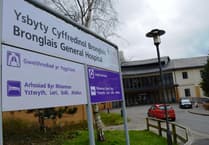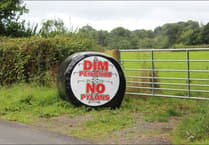What the hell to do? Amid this tempest of spiralling costs, writes Gareth James. Realising that personal economies (such as ditching Sky Sports) are not enough to avoid sinking. Understanding that existing in the uplands is expensive, so more consequential changes must be made. I am moving into Aberystwyth. And I am not the only one.
I will miss the clear-eyed characters who inhabit these hills. The unrivalled privacy and the inescapable community of a small Welsh village. I will miss strolls through the forest, the views, and (weekend warriors apart) the peace and quiet of our wilderness. I will miss the sound of birdsong and waterfalls, the unspoiled starry nights, and having a garden. I will miss crystal-clear tap-water and log fires on freezing winter evenings. Chopping wood in the cold? Not so much. Homes in hills are rarely new builds and two-foot stone walls require a great deal of warming.
Weather in town is kinder. And with connection to the gas-main, keeping warm easier and cheaper. Plus, a mobile phone signal. Tesco right there. The Post Office just up the road. Located only a moment from the train station, I will not need to fund a car. I will be simpler to locate for approaching deliveries, and for routinely disorientated family and friends. There is more going on in town, so they say. The beach is a short stroll from my front door.
So, for many, this round of belt tightening will be considerably more devastating to well-laid plans, savings, and personal wellbeing than the minor discomfort suffered during my forced relocation. For many, the scale of the financial downturn will be a new and terrifying experience. For others, an unwelcome resumption of hard times. For all but a few of the rest, this steepest cost-of-living upsurge in a generation will intensify an already overwhelming crisis.
Wales, with the lowest disposable household income in the UK, with the second highest increases in child poverty nationally, has a significant section of the population in urgent need. In response, the Trussell Trust have provided hundreds of thousands of emergency food parcels throughout Wales. And on February 14, the Welsh Government announced a £150 cost-of-living payment to be paid ‘as soon as possible’ into the rapidly emptying pockets of millions of under-pressure households. These emergency payments were made by many local authorities all the way back in April.
Yet, across Ceredigion, disregarding the scale of the problem, ignoring the immediacy of the crisis, and offering scant consideration for those families in most need, cost-of-living payments have been bewilderingly glacial in progress.
By the beginning of June, Ceredigion Council confirmed issuing only the first tranche of cost-of-living payments to residents paying their council tax by direct debit. Households in most desperate straits, of course, are unlikely to be paying council tax, let alone by direct debit. Two weeks later, at time of writing, the most financially vulnerable are yet to receive a penny of this ‘emergency’ payment.
The council’s most recent response? Ceredigion County Council ‘have given priority to this scheme and working with our software supplier to establish the systems required to deal with new payments.’
To have the organisation tasked with protecting the region’s most deprived, being so clueless to the reality of hardship, is inexcusable. The rollout was obviously deficient in planning and has been deficient in execution. Having received these funds, to then navel gaze with their ‘software supplier’ for months, and finally to make such a Horlicks of distributing cost-of-living payments, I hope, is not indicative of how Ceredigion Council’s leadership will manage future assistance already promised to our most under-pressure residents.





Comments
This article has no comments yet. Be the first to leave a comment.